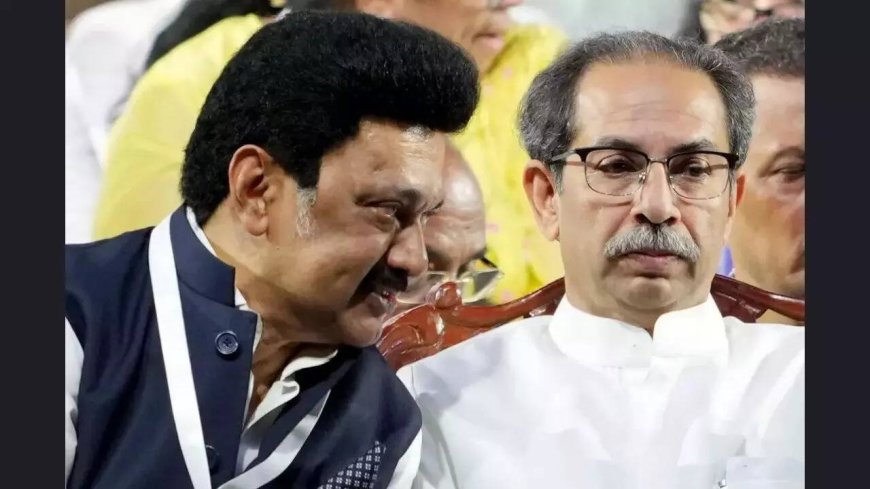DMK and Uddhav Thackeray Join Forces Against Hindi Imposition: A New Front in India’s Language Politics
DMK and Uddhav Thackeray’s Shiv Sena faction are holding a joint rally in Pune against the central government's alleged Hindi imposition, reviving debates on language politics in India.

In a significant political development with national implications, Tamil Nadu’s ruling Dravida Munnetra Kazhagam (DMK) and Uddhav Thackeray’s Shiv Sena (UBT) faction in Maharashtra are set to hold a joint rally this week. The rare show of inter-state unity is aimed squarely at resisting what both parties describe as the “aggressive promotion of Hindi at the cost of regional languages.”
The announcement was made jointly by DMK spokespersons and leaders from Uddhav Thackeray’s camp, triggering fresh conversations around India’s long-standing language debates, cultural autonomy, and regional identity.
A Rally Symbolizing Cultural Federalism
The proposed rally, expected to take place in Pune, is being positioned as a pan-regional assertion of linguistic rights. DMK's general secretary Duraimurugan emphasized that the effort is not about opposing Hindi, but about safeguarding the constitutional status of all Indian languages. He stated:
“We are not anti-Hindi. We are anti-imposition. Tamil, Marathi, Bengali, Kannada, and all languages deserve respect, not marginalization.”
Uddhav Thackeray, speaking to reporters in Mumbai, echoed similar sentiments, saying the event aims to highlight the “North-centric language mindset” dominating recent central policy decisions. The rally’s theme—“India is Many Languages”—captures the ideological tenor of the initiative.
The Flashpoint: NEP and Government Circulars
This fresh political alignment follows recent circulars by central agencies and educational institutions that reportedly made Hindi mandatory in select recruitment exams and curricula, particularly in central universities and public sector institutions. Critics, including several southern and northeastern leaders, argue this goes against the spirit of linguistic equality enshrined in the Indian Constitution.
The National Education Policy (NEP) 2020 also remains a key point of contention, with many non-Hindi-speaking states alleging that it implicitly prioritizes Hindi over regional languages under the guise of a three-language formula.
DMK and the Legacy of Anti-Hindi Movements
The DMK’s opposition to Hindi imposition is deeply rooted in Tamil Nadu’s political history. The anti-Hindi agitations of the 1960s, which led to large-scale protests and even self-immolations, are widely credited with shaping the Dravidian movement’s identity.
By allying with Uddhav Thackeray—whose own party has historically had a Marathi pride agenda—the DMK signals a renewed pan-Indian front to challenge what they see as linguistic centralization. The alliance also aims to tap into growing discontent in Maharashtra, West Bengal, Karnataka, and the Northeast, where regional language speakers feel threatened by perceived Hindi hegemony.
Constitutional Debate: Is Hindi Being Imposed?
As per the Official Languages Act, 1963, English and Hindi are co-official languages at the federal level. However, the Indian Constitution does not declare Hindi as the national language, a point repeatedly stressed by linguistic rights activists.
Constitutional expert Faizan Mustafa recently pointed out in a ThePrint article:
"Imposing Hindi violates the federal structure and constitutional morality."
Legal scholars note that while encouraging language learning is important, compulsion through state power undermines diversity, one of India’s strongest democratic assets.
Political Implications and Opposition Reaction
While DMK and Shiv Sena (UBT) rally around the cause of linguistic equity, opposition parties like the BJP have accused them of “divisive politics.” Union Minister Dharmendra Pradhan called the joint rally “an attempt to reignite regional tensions for electoral gain.”
However, political observers say that the growing unease among non-Hindi-speaking states cannot be ignored. Analysts point to rising resistance from states like West Bengal, Kerala, and even Odisha on similar grounds. A recent survey by Lokniti-CSDS indicated that over 62% of respondents in non-Hindi speaking regions preferred governance in their mother tongue.
Building a Broader Coalition?
This rally could be a precursor to a larger regional language coalition ahead of the 2026 general elections. With the New Development Bank reforms being discussed and calls for regional empowerment growing, language politics could re-emerge as a key electoral theme, especially in South and West India.
Sources within the Indian National Developmental Inclusive Alliance (INDIA) bloc suggest that more parties—including TMC, JD(S), and BRS—may soon join similar initiatives to resist the centralization of language policy.
Conclusion
The DMK-Shiv Sena rally is more than a symbolic gesture. It is a strategic move with deep roots in India’s federal ethos. As language continues to intersect with identity, education, employment, and politics, this joint front may very well reshape the regional-national dynamics in the country. Whether it leads to meaningful policy shifts or escalates into another phase of cultural confrontation remains to be seen.














